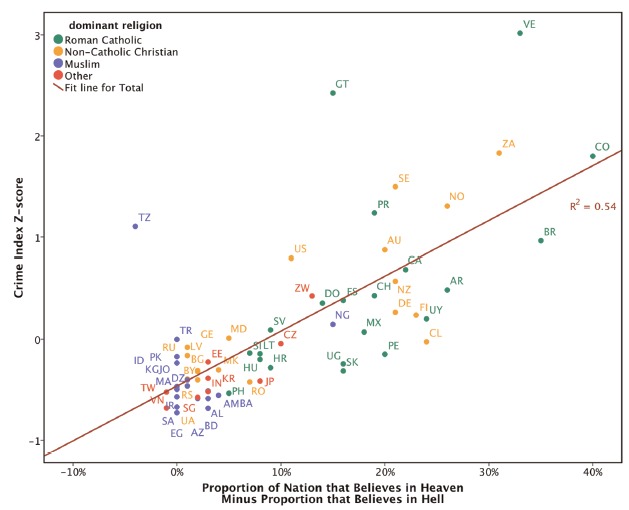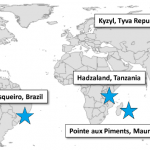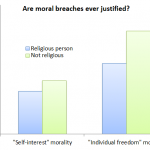 Azim Shariff, who’s now at the University of Oregon in the USA, has taken a look at how belief in heaven and hell relates to crime rates around the world.
Azim Shariff, who’s now at the University of Oregon in the USA, has taken a look at how belief in heaven and hell relates to crime rates around the world.The basic approach was dead simple. Using data from the World Values Survey, he subtracted the proportion of people who believe in hell from the proportion that believes in heaven.
Then he took a bunch of crime stats provided by the UN (homicide, rape , kidnapping, assault, theft, drug crime, auto theft, burglary, and human trafficking), computed an overall crime score for each nation, and correlated one against the other.
The result, shown in the figure, shows a clear relationship. Crime rates are lowest in nations where equal numbers of people believe in both heaven and hell.
As belief in hell drops away, so that more people believe in heaven but not in hell, crime rates go up.
Now, if you look at the figure closely, you will see that there are some trends here – poor Muslim countries have high belief in hell and low crime rates, while wealthy Christian nations have low belief in hell and high crime rates.
Shariff adjusted for a wide range of factors, including the nation’s majority religion, wealth, inequality, life expectancy, urbanisation and dominant psychologies. He also adjusted for belief in God and religious service attendance.
Doing all this had pretty much no effect – the result was just as strong and clear cut. What’s more, Shariff found that countries with a high belief in God in general also had lower crime rates.
Now that’s a pretty surprising result. Shariff argues that this is evidence that belief in hell reduces crime through a supernatural deterrent effect, which is possible (see Punitive Gods stop cheaters, compassionate gods encourage them).
But I would have expected any such deterrent to be relatively weak compared with the opposite effect – that high crime rates would encourage higher rates of belief in God.
That’s certainly what your would expect from other studies. Daniel Treisman found that high levels of belief in hell are accompanied by high levels of fear, and Gary Jensen has found that ‘passionate dualism’ (characterised by high levels of belief in hell along with religious fervour) is linked to high rates of homicide.
So what could be going on here? Well, there are some strange anomalies in the data. For a start, according to these data, Sweden and Norway are among the most crime-ridden countries in the world – on a par with South Africa!
Perhaps there is a problem here with how crime is recorded. Gregory Paul, in his comment on the article, points out that there are serious problems with trying to compare cross-national crime rates:
Interpol merely gathers and reports nonlethal crime statistics provided by member nations without standardizing or vetting it. For example, assaults are reported at a rate about 6 times higher in Australia and Sweden than in Canada and France, this level of disparity is suspect. Rates of theft are reported to be twice as high in Sweden as in France; are the former actually twice as larcenous as the French, or are the latter twice as unlikely to file a report, or is the reality somewhere in-between?
Similarly suspicious discrepancies exist in International Crime Victims Survey results. Reported rates of rape are two to twenty times higher in the U.S. than in other 1st world nations, but this only means that American females report being raped at far higher rates, not that American males are more prone to committing sexual assaults.
Nonlethal crimes are difficult to compare even between the relatively uniform 1st world countries, they only grow worse when comparing 2nd and 3rd world nations with greater disparities between the quality of crime reporting.
So part of it may simply be that crime reporting and recording is done less efficiently in nations with a high level of belief in hell. But this can’t be the whole story.
That’s because there is one crime statistic that is comparable between nations: homicide. Homicide is usually reported and recorded, and is relatively easy to define in a standardised way.
And yet Shariff finds that homicide, too, is linked to belief in Heaven without belief in Hell. The effect is weaker – only about half as strong as for crime in general – but it’s still there.
So how to explain the discrepancy between this result and that of the earlier studies? Well, one factor may be how Shariff has computed his measure of belief.
Shariff subtracted the percentage of people who believe in heaven from the number who believe in hell. So that means, for example, a country in which 95% of people believe in heaven and 50% in hell is scored exactly the same as a country in which 50% of people believe in heaven and only 5% believe in hell.
Yet you would expect these to be quite different countries. All they have in common is that around half the population believe in heaven and not in hell.
So perhaps that’s it. It’s not that belief in heaven affects crime rates, or that belief in hell does. It’s that believing in a compassionate God increases crime rates.
I’m not really convinced – I think there are too many problems with the data to make strong conclusions. But it’s an intriguing idea.
Shariff AF, & Rhemtulla M (2012). Divergent effects of beliefs in heaven and hell on national crime rates. PloS one, 7 (6) PMID: 22723927
 This article by Tom Rees was first published on Epiphenom. It is licensed under Creative Commons.
This article by Tom Rees was first published on Epiphenom. It is licensed under Creative Commons.













